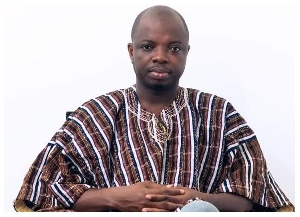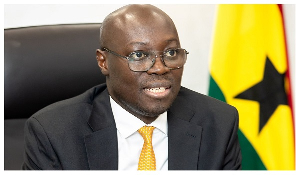By John Amponsah
I read with keen interest the article written by Kwesi Tawiah-Benjamin on Ghanaweb (18/06/13) and was stimulated to add to that discussion by writing this article. I aim to promote further discussion of this fascinating subject as I am interested in learning from the lay opinions as well as the professional input of other contributors to this website.
Careful observers may note (or may have already noted) that Pidgin English is spoken in a manner that applies the linguistic structure of our local languages (e.g. Twi) to the English language and as such is closer to our own ways of speaking than to the Queen's way of speaking.
Further to that, one may also note that various forms of Creole spoken in the Caribbean and even 'Ebonics' (a term coined by Robert Williams) spoken especially among the Black populations of the United States reflect grammatical structures inherent in a number of West African languages.
Based on the inherent differences between the grammatical structures of West African and European languages, one could argue that learning to speak Creole, Ebonics or Pidgin (different names for the same phenomenon) does not necessarily retard learning to speak the original European language upon which the Creole or Pidgin is based, since both original and modified versions of the European language are based on different grammatical and syntax structures.
The modification/mutation (or bastardization if you will) of European languages into their Creole/Pidgin forms is perhaps an unintended but nevertheless direct consequence of European actions starting in the period of industrialized human slavery which was followed by institutionalized colonization. Both events caused blacks and whites to interact in ways that changed the history and the culture of each respective group. Interactions between blacks and whites caused the blacks to adapt to the European presence, leading to the creation of these modified forms of speaking the European languages of the slavers and colonizers among others.
Today, many black people found in the Caribbean and in America no longer have an African language/mother tongue such as most of us on the African continent do. Yet they have Creole/Ebonics -- mutated forms of European languages based on the grammatical structures of their original, ancestral African languages. History happened. Although these blacks no longer have an African language, one of their main ways of connecting to their ancestral past is by speaking modified/mutated forms of European languages based on (for the most part) West African language grammatical structures. I find this to be truly intriguing.
A Wikipedia article entry (retrieved on 18/06/13) entitled “West African Pidgin English” has this to say under the section on ‘structure’: “Like other Pidgin and Creole languages, West African Pidgin English took the majority of its vocabulary from its target language (English), and much of its sound system, grammar, and syntax from the local substrate languages (West African Niger–Congo languages).”
The same article makes some insightful points related to the point I made above (regarding connecting to the original ancestral culture) in the section on ‘Maroon Spirit Language’: “The Jamaican Maroons who live in the mountainous interior of Jamaica have preserved a ritual language which, according to linguists, resembles the West African Pidgin English that was spoken along the coast of West Africa centuries ago during the era of the Atlantic Slave Trade. The Maroons' ancestors were runaway slaves who created free settlements in the interior of Jamaica and managed to hold on to their freedom for generations. Today, the Maroons speak Jamaican Creole in their daily lives, but they have also retained a ritual language that they call "Deep Patois" which is used during their "Kromanti Play," a ceremony in which the participants are said to be possessed by their ancestors and to speak as their ancestors did centuries ago. Linguists call the Deep Patois "Maroon Spirit Language" (MSL), and they point to many conservative phonological and grammatical features in MSL that are not found in modern Jamaican Creole. Some of these features are still present, though, in related Creole languages, such as Sierra Leone Krio spoken in West Africa and Sranan Tongo spoken in Suriname in South America.”
There are many Akan and other African descendants in Jamaica in particular. There is even a place in Jamaica called “Accompong Town”. Obviously, “Accompong” is a corrupted form of “Acheampong”. It is known as the town of the Maroons, founded by rebel slaves, who once had a leader called Cudjo (i.e. Kojo or perhaps the Ga equivalent). While I visited the country years back, in the up-country regions, the names they had for some foodstuffs were similar to their respective names in Akan. I have heard the “Deep Patois” being spoken, and if you think that regular Jamaican Patois is difficult to comprehend, wait till you hear Deep Patois. To me, it sounded rhythmical but almost unintelligible, but fascinating!
In certain places such as Suriname, it is possible to see/notice the transformation of languages by listening to their version of Creole, which still has relatively high percentages of Twi mixed in with other European languages. In fact, after listening very carefully to a Suriname spiritual ritual (their version of the Maroon Spirit Language), I heard words related to events surrounding the Akyem and the Denkyira of past times. The spiritually possessed Suriname man said “Kasa, me tie!” (Speak, I’m listening). He also mentioned “Kotoku” and “Dunkwa”. One can also hear “me me sasa benkuma” being said. All of this comes from the Twi language. It is quite likely that these influences trace back to the times of the ethnic wars, prior to the colonial period.
So returning to the original topic, one could in a sense even say that speaking Creole/Pidgin is more "African"/"Afrocentric" than speaking the proper versions of European languages, such as posh Oxford English! Some people will not agree with this (those who see speaking Pidgin as detrimental to language development), however by looking at our recent history (of the last few hundred years) and at the factors that led to the formation of Creole/Pidgin in West Africa and in the African Diaspora, it should be clear that Pidgin English has indeed emerged as a part of our collective (black people’s) history, and hence it should probably not be regarded as a cultural-historical relic to discard, especially seeing as it can be argued that speaking it does not necessarily impede on one’s ability to speak proper versions of the original European languages on which the Pidgin versions are based.
Opinions of Wednesday, 19 June 2013
Columnist: Amponsah, John


















